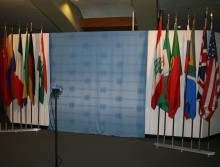 The past week has been an intense one in the Middle East, including the much-anticipated nuclear talks between Iran and the world powers and the massacre in Syria and subsequent diplomatic fallout. But despite all the press releases and statements, did anything important happen? Or are two of the world’s deadliest regimes buying time with blood and empty words?
The past week has been an intense one in the Middle East, including the much-anticipated nuclear talks between Iran and the world powers and the massacre in Syria and subsequent diplomatic fallout. But despite all the press releases and statements, did anything important happen? Or are two of the world’s deadliest regimes buying time with blood and empty words?
The negotiations last week in Baghdad between Iran and the P5+1—the US, the UK, France, Russia, China and Germany—achieved little if anything. Both sides made proposals. Lots of talking, apparently serious, occurred. And another meeting in mid-June in Moscow was set.
But Iran’s centrifuges are still spinning out more nuclear fuel with no sign of slowing down. What should be a crisis point—Iran is moving more nuclear enrichment capabilities underground, the Israelis are getting really nervous and there are more and more indications that Iran has been working on nuclear weapons—is being conducted like there’s all the time in the world.
The situation in Syria is even worse. Days after a brutal killing in which more than 100 people were killed by forces aligned with the government—an attack that included shelling a residential neighborhood—the world responded initially by rapping Syria firmly on the hand. They kicked out a number of diplomats from Syrian embassies around the world, which doubtless immediately caused President Bashar al-Assad to stop, think about what he was doing—and decide he has little to lose.
To their credit, the US is considering further steps. The reporters working in the State Department asked US spokesperson Victoria Nuland what else could be done, or how the kicking out of Syrian diplomats stops the violence. She said this was a “statement” move and said they were looking at additional options to pressure Assad.
The one positive out of all of this is that the US is clearly moving towards a determined call for United Nations sanctions on Syria over the regime’s ongoing brutality. US Ambassador to the UN Susan Rice noted that sanctions were a potential option as she said the UN Security Council was nearing time to “assume its responsibilities and to put additional pressure” on Assad.
She contrasted that with the horrific prospect of a civil war breaking out in the country, with arms coming into the country from other nations to support each side in the fight and steps being conducted outside the UN. It has appeared that the US prefers the sanctions route to the armed conflict approach, so even in the worst case scenario it’s doubtful the Americans would openly arm the rebels.
So at least the US is talking tough. It’s becoming now or never time. It’s time to act, or else. And the alternative to things improving is disaster.
Hopefully these sentiments are being seriously pondered and discussed by the entire West. It’s been months of seeming second chances and “turning points” for Syria.
Is an arms embargo on the table? Is the West talking seriously about flying in humanitarian aid or creating safe zones for civilians?
Unfortunately, the past week has shown a tragic lack of urgency in dealing with Iran and Syria. War shouldn’t be rushed into, but sanctions should be intensified dramatically. Rhetoric should intensify. And the West should be exposing Russia and China’s hypocrisy by holding vote after vote in the Security Council on these issues.
Instead, it’s been a week of headlines—not deadlines. Unless you count the lines of dead in Syria.
The simple reality is that the West is being faced with two evils—strict diplomacy while imposing devastating sanctions, unilaterally if necessary, or allowing innocents to be butchered and a terror-sponsor to move towards nukes.
The West should keep talking, while also acting. It’s past time to take these steps. Talk is cheap. Blood and peace are not.
(By Joshua Spurlock, www.themideastupdate.com, May 31, 2012)
